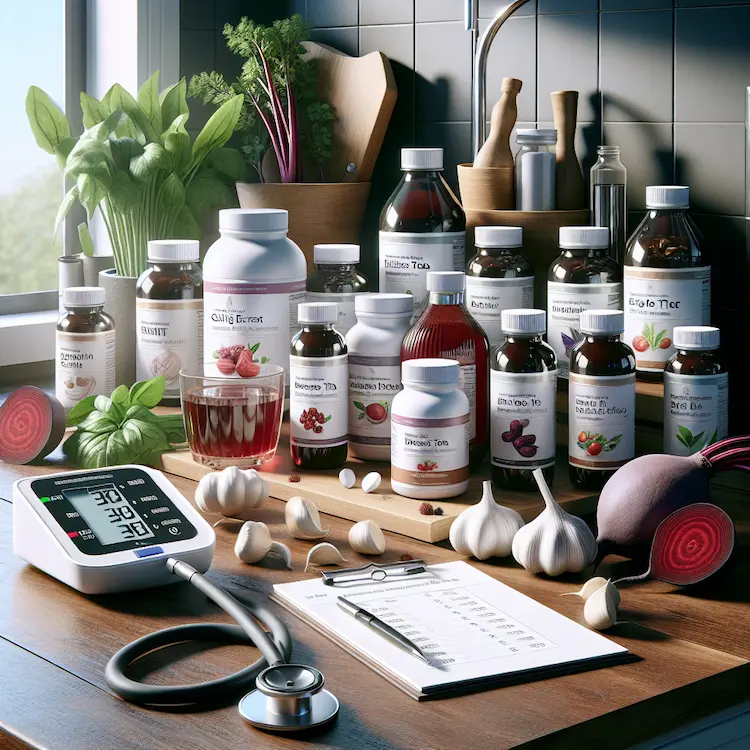Hypertension, or high blood pressure, is a global health concern affecting billions of people worldwide. As the search for effective and natural solutions continues, herbal supplements have gained attention for their potential to manage blood pressure. This article explores the impact of various herbal supplements on blood pressure, their mechanisms of action, and their efficacy in promoting cardiovascular health.
Blood pressure is the force exerted by blood against the walls of arteries as the heart pumps. It is measured in millimeters of mercury (mm Hg) and expressed as two numbers: systolic pressure (when the heart beats) over diastolic pressure (when the heart rests between beats). Normal blood pressure is typically below 120/80 mm Hg, while hypertension is defined as consistently elevated readings of 130/80 mm Hg or higher.

Herbal supplements, rich in bioactive compounds, have shown promise in managing blood pressure. These natural remedies often work through various mechanisms, including:
Let’s explore some of the most studied herbal supplements and their effects on blood pressure.
Garlic has been used for centuries in traditional medicine and has shown significant potential in reducing blood pressure. A meta-analysis of clinical trials revealed that garlic supplementation could decrease systolic blood pressure (SBP) by an average of 8.3 mm Hg and diastolic blood pressure (DBP) by 5.5 mm Hg. This effect is comparable to some antihypertensive medications.
Mechanism: Garlic’s active compound, allicin, promotes smooth muscle relaxation and vasodilation, contributing to its blood pressure-lowering effects.
Hibiscus tea has gained popularity for its potential antihypertensive properties. Studies have shown that consuming hibiscus tea or extract can significantly lower both systolic and diastolic blood pressure in adults with mild to moderate hypertension.
Mechanism: Hibiscus contains polyphenols that act as diuretics and have antioxidant effects, contributing to blood pressure reduction.
Beetroot juice has emerged as a potent natural supplement for blood pressure management. Rich in nitrates, it has been shown to significantly reduce both SBP and DBP.
Mechanism: The nitrates in beetroot juice are converted to nitric oxide in the body, which helps dilate blood vessels and improve blood flow.
Olive leaf extract has demonstrated promising results in lowering blood pressure. A study found that regular consumption of olive leaf extract could reduce the risk of coronary heart disease by 9-14%
Found in grapes and red wine, resveratrol has shown potential in improving cardiovascular health and lowering blood pressure.Mechanism: Resveratrol enhances the production of nitric oxide and has antioxidant properties, which contribute to its blood pressure-lowering effects.
| Herbal Supplement | Average SBP Reduction (mm Hg) | Average DBP Reduction (mm Hg) | Mechanism of Action |
|---|---|---|---|
| Garlic | 8.3 | 5.5 | Vasodilation, NO production |
| Hibiscus | 7.2 | 3.1 | Diuretic, Antioxidant |
| Beetroot Juice | 4.4 | 1.1 | NO production |
| Olive Leaf Extract | 11.5 | 4.8 | Antioxidant, Anti-inflammatory |
| Resveratrol | 2.0 | 1.9 | NO production, Antioxidant |
Note: The values presented are approximate and may vary based on individual studies and dosages.
Several other herbal supplements have shown potential in managing blood pressure:
Herbal supplements work through various mechanisms to lower blood pressure:

While herbal supplements can be beneficial, it’s crucial to approach their use with caution:
Herbal supplements offer a promising natural approach to managing blood pressure. Garlic, hibiscus, beetroot juice, olive leaf extract, and resveratrol have shown significant potential in reducing both systolic and diastolic blood pressure. These supplements work through various mechanisms, including enhancing nitric oxide production, improving endothelial function, and providing antioxidant effects.
While the results are encouraging, it’s essential to remember that herbal supplements should not replace prescribed medications or lifestyle modifications. A holistic approach to blood pressure management, including a balanced diet, regular exercise, stress reduction, and appropriate medical care, remains crucial.
As research in this field continues to evolve, we may discover even more effective herbal remedies for hypertension. However, it’s vital to approach the use of herbal supplements with caution and under the guidance of healthcare professionals to ensure safety and maximize benefits.